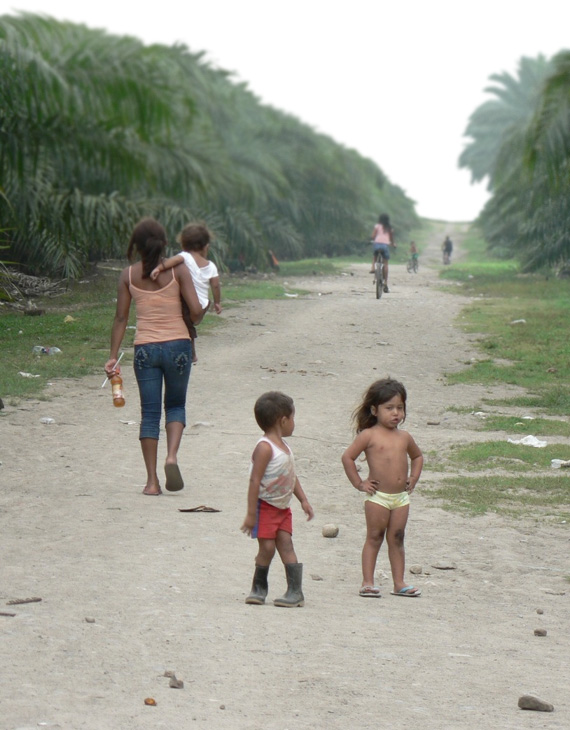|
An alarming
scenario of deprivation of the most basic rights unfolded before the members of
Rel-UITA and the other organizations that are participating in the International
Mission to Bajo Aguán. This northeastern corner of Honduras has become a
no-man’s land where African palm rules.
The reports
filed by hundreds of Bajo Aguán peasant families struggling for access to land
and decent living conditions all speak of unchecked violence and systematic and
selective murders that go unpunished, a court system that harasses the people,
overcrowded housing conditions, lack of access to basic services, and the
government’s failure to comply with any of the agreements it signs.
During its
first days in Bajo Aguán, the mission team, formed by representatives of several
national and international organizations,1
visited the settlements occupied by the United Peasants Movement of Aguán (Movimiento
Unificado Campesino del Aguán, or MUCA) and met with lawyers of the
victims and members of the Authentic
Movement for the Rights of Aguán Peasants (Movimiento
Auténtico Reivindicador de Campesinos del Aguán, or MARCA).
As they visited
the settlements and interviewed the people living there, the members of the
mission team were able to perceive again and again the widespread violence and
impunity that these people suffer. But as they came up to give their
testimonies, the men and women of Bajo Aguán also evidenced an unwavering
fortitude that sustains them as they struggle for their rights.
“We’re up
against very difficult situations. The government signs agreements with us, only
to ignore them. We don’t own the land, we’re living in plastic champas
(huts), many of our children are sick, and most have no access to education,”
Ricardo Morales, of La Lempira settlement, told
Sirel.
“There are more
than 300 families here. We plant our own food and work in the palm fruit harvest
but we’re just barely surviving. We’re constantly bullied by private guards
hired by Miguel Facussé.”
“After 6 p.m.
we can’t move freely because they’re surrounding us. They threaten us, point
their guns at us, and fire shots in the air to terrorize us.”
“A single
person can’t own this much land while we’re all being denied the right to work
and live decently,” Morales said.
Threats,
persecution and murder are words that keep coming up in the testimonies of the
people of Bajo Aguán. With tears in her eyes, Margarita Méndez Ramírez
recalls how a hired gunman killed her husband, José Leonel Guerra, a
member of MUCA, in front of their terrified daughters.
“He got up to
go to his mom’s and as he stepped out into the street a man drove by on a
motorcycle and shot him. They killed him in front of our daughters. They were
right there and saw him being gunned down. I ran out but there was nothing I
could do. Our youngest daughter was only a few days old.”
“We filed a
report with the Prosecutor’s Office, but the case is not being followed and
nothing is being done to bring the killer to justice. In this country you just
can’t trust justice,” Méndez Ramírez said.
Impunity and harassment from the justice system
According to
the lawyer who is following numerous court cases against members of the peasant
movement, in Bajo Aguán there is clearly a situation of impunity and harassment
by the justice system, and the people live in a permanent state of
defenselessness.
“They’re
treating the struggle of the peasants as a criminal activity. We’ve been able to
get 80 activists out of jail, but there are people with as many as seven pending
trials, and 162 peasants have been prosecuted in the area since January 2010.”
The lawyer, who
preferred to remain anonymous for personal safety reasons, also said that the
Prosecutor’s Office has acted as a spearhead for large landholders, representing
the interests of palm producers.
“In the city of
Trujillo, in particular, the prosecutors are extremely aggressive, they’re like
inquisitors who are out to suppress any efforts to defend the peasants. The
courts and the prosecutors here are criminalizing social protests, they’re pawns
who respond to the interests of agro-industrial producers,” the lawyer
concluded.
Right before
this article was posted, SIREL was informed that MUCA director
Matias Valle had been arrested and taken to the Central
Támara Penitentiary for illegal possession of a weapon.

|